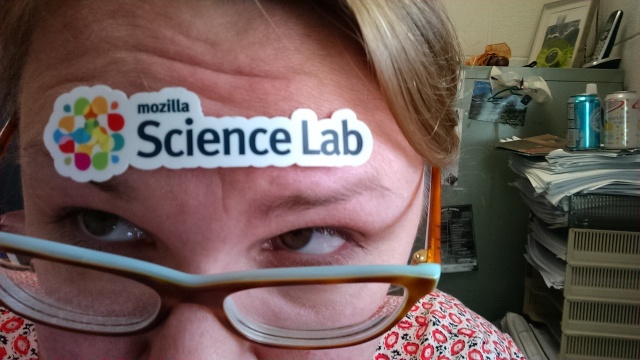So, this happened. Apparently, yelling into the void about data management and reproducibility is a very good way to get yourself onto a rag-tag team of open-science proto-superheroes.1 Yes, that’s right, I’m a Mozilla Science fellow, and together, baby, we’re gonna change the world!2
For the next ten months, I’m working with the amazing people in the Mozilla Science Lab, my fellow, um, Fellows, and the community to catalyze open and reproducible practice in science. My focus is on open data: making our datasets and data handling reproducible and open, incentivizing open practice, training students in techniques for openness/reproducibility, and building trust for open science in the community.3
I will be leading (I think) two main projects.
I’m developing an open science course for graduate students, based on using #otherpeoplesdata. The concept is to create an adaptable curriculum which can be applied to a wide variety of fields, and taught using a distributed teaching, or online teaching model (or both). At the beginning of the course, groups of 4-5 students will be given (or choose) an #otherpeoplesdata set, and they will be taken through the process of data cleaning, documentation, sharing, data manipulation, analysis, interpretation, writeup, and eventual submission to a journal,4 all using open science practices. I will draw upon curriculum developed for Software Carpentry and Data Carpentry, some of my own ideas from my own (fever?) dream course, and get my students to apply the principles they’re learning to real data, over a semester-long course. I will deliver a protoype of this course in the winter semester to willing guinea pigs grad students in the Department of Entomology (and a few related academic units).
Reasons to like this:
- Students get experience with academic publishing early in their programs, including authoring a paper!
- Helps deal with backlog of under-utilized data generated by large scale projects
- Provides an outlet for orphaned datasets to get legitimately analyzed
- Training which allows labs to get in compliance with new guidelines from federal agencies
- Gets a new generation of scientists starting out on a open science foot.
My second project idea is a little less developed, but came from chatting with my mother-in-law, a retired professor.5 My inlaws have both generated a lot of data over their careers, and she mentioned that my FIL has years and years of unpublished data on desmids in their basement, and they’d be happy to let students have a crack at it. It got me to thinking about how much data was in this form, and how, as these scientists age, the likelihood that all their work will be lost to history. So what if we created a registry- a data database- of all these data which are held by older scientists who need a bit of help to get it out? This would allow students in the open science course to partner with older scientists- do the grunt work on cleaning, preparing, and analysing, getting help with the interpretation directly from the data creator, and then publishing the results together.
I know, it’s all very circle-of life, but I see it as an opportunity for older scientists to preserve their legacies while helping to foster the skills in the new generation, and so I like it.
Anyway, I’m going to work on putting together a more detailed course description in the coming days, so I’ll be calling out to the community for comment on that.
Send my love to the kids,
-Dr. B.
—
1. Seriously, go check out my fellow Fellows. These folks are FORCES OF NATURE. Not to mention the people at the Mozilla Foundation. Between them, I’m pretty sure we could tackle anything. (Zombies?)
2. I’ve legit been sourcing capes for MozFest. Finally, I’m getting to wear a cape. In a professional context.
3. I am the Open Data Avenger!
4. A journal that is not hung up on impact or statistically significant results, and is only concerned with quality of science. Like PloS, but cheaper. Like https://peerj.com/.
5. MIL’s magnum opus, “Taming the Wild Grape,” will be available in time for Christmas. Don’t delay, preorder one for everyone in the family!


Congratulations! This is beyond amazing, they definitely chose the perfect Open Science Superhero for the job! I look forward to closely following everything as it develops!